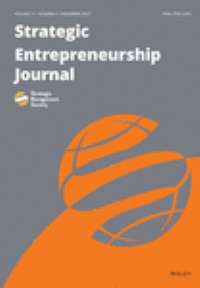Founder's entry strategy and funding performance in the crowdfunding industry: The mediating role of founder's attention
IF 6.3
2区 管理学
Q1 BUSINESS
引用次数: 0
Abstract
Research SummaryBuilding on recent studies on founders' entry strategy and the attention‐based view, our study examines the underexplored relationship between entrepreneurial entry mode and funding performance. We offer a novel perspective on how different entry strategies—such as hybrid, portfolio, and full‐time entrepreneurship—impact start‐up performance. Additionally, we develop a theoretical framework highlighting founder attention as a mediator in this relationship. Our research was conducted in the crowdfunding context, with findings remaining consistent across multiple measures of founder attention and funding performance. To address potential endogeneity concerns, we employ two‐stage instrumental variable analyses and a propensity score matching method, ensuring the robustness of our results.Managerial SummaryEntrepreneurs' choice of entry strategy plays a critical role in shaping their ability to secure funding and drive their start‐up success. Our study highlights how different entry strategies—hybrid, portfolio, and full‐time entrepreneurship—affect funding performance, particularly in the crowdfunding context. A key insight is the role of founder attention in mediating the relationship between entry strategy and funding success. The way founders allocate their focus across different pursuits influences investor perceptions and financial outcomes. Therefore, aligning entry strategies with the ability to effectively manage and signal commitment to ventures is essential from a practical standpoint. Moreover, entrepreneurs and investors should consider how strategic entry choices impact not only operational execution but also the likelihood of securing financial support.众筹行业创始人进入策略与融资绩效:创始人关注度的中介作用
基于最近关于创始人进入策略的研究和基于注意力的观点,我们的研究考察了创业进入模式与融资绩效之间未被充分探索的关系。我们提供了一个关于不同的进入策略(如混合、投资组合和全职创业)如何影响创业绩效的新视角。此外,我们开发了一个理论框架,强调创始人的注意力是这种关系的中介。我们的研究是在众筹背景下进行的,其结果在创始人关注度和融资表现的多种衡量标准中保持一致。为了解决潜在的内生性问题,我们采用了两阶段工具变量分析和倾向评分匹配方法,以确保我们的结果的稳健性。企业家进入战略的选择在塑造他们获得资金和推动创业成功的能力方面起着至关重要的作用。我们的研究强调了不同的进入策略——混合、投资组合和全职创业——如何影响融资绩效,特别是在众筹环境中。一个关键的观点是,在进入策略和融资成功之间的关系中,创始人的注意力起到了中介作用。创始人在不同领域分配精力的方式会影响投资者的看法和财务结果。因此,从实际的角度来看,将进入战略与有效管理和对企业承诺的能力相结合是必不可少的。此外,企业家和投资者应该考虑战略进入选择如何不仅影响运营执行,而且影响获得财务支持的可能性。
本文章由计算机程序翻译,如有差异,请以英文原文为准。
求助全文
约1分钟内获得全文
求助全文
来源期刊

Strategic Entrepreneurship Journal
Multiple-
CiteScore
11.10
自引率
1.60%
发文量
31
期刊介绍:
The Strategic Entrepreneurship Journal is a research journal that publishes original work recommended by a developmental, double-blind review process conducted by peer scholars. Strategic entrepreneurship involves innovation and subsequent changes which add value to society and which change societal life in ways which have significant, sustainable, and durable consequences. The SEJ is international in scope and acknowledges theory- and evidence-based research conducted and/or applied in all regions of the world. It is devoted to content and quality standards based on scientific method, relevant theory, tested or testable propositions, and appropriate data and evidence, all replicable by others, and all representing original contributions. The SEJ values contributions which lead to improved practice of managing organizations as they deal with the entrepreneurial process involving imagination, insight, invention, and innovation and the inevitable changes and transformations that result and benefit society.
 求助内容:
求助内容: 应助结果提醒方式:
应助结果提醒方式:


